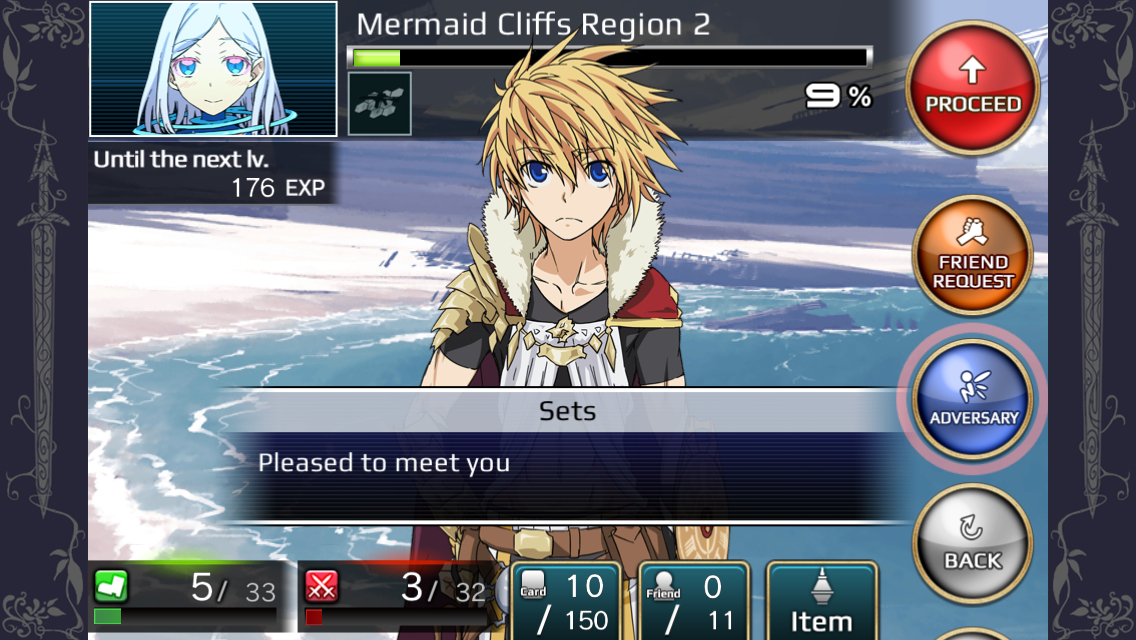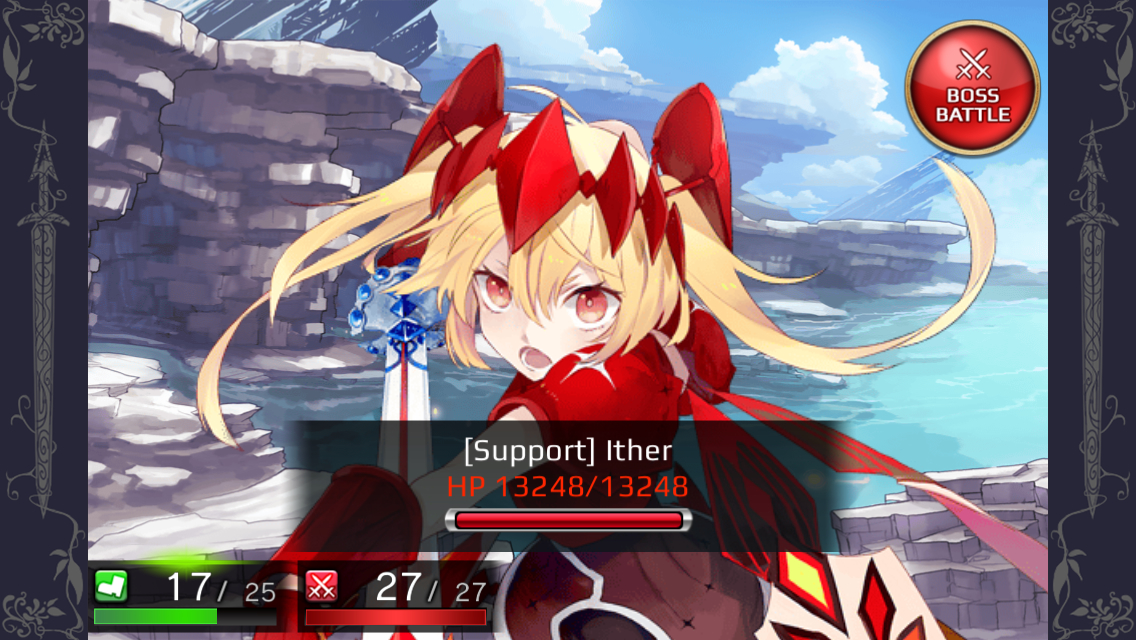![]() Although it’s a new arrival in most of the world, Million Arthur (Free) is a relatively old game in a very young sub-genre. In Japan, it arrived mere months after the release of Puzzle & Dragons (Free), and while its story and production values made it a cross-media hit in its home country, the gameplay feels it’s from another era. The best analogy I can make is to go back to the early days of first-person shooters. Developer id Software had released their breakout hit Wolfenstein 3D ($1.99) through publisher Apogee, but were going it alone for their next title. Apogee created a new game called Blake Stone that was built on Wolf 3D‘s skeleton, offering greater interactivity and a more open structure. It was a fine evolution of the gameplay established in Wolf 3D. The only problem was, the week after Blake Stone released, id Software released Doom ($4.99), and suddenly the whole tea table was up-ended. Million Arthur is Blake Stone, but for social RPGs, and outside of Japan, it’s not releasing in the same window as its assassin, but years later.
Although it’s a new arrival in most of the world, Million Arthur (Free) is a relatively old game in a very young sub-genre. In Japan, it arrived mere months after the release of Puzzle & Dragons (Free), and while its story and production values made it a cross-media hit in its home country, the gameplay feels it’s from another era. The best analogy I can make is to go back to the early days of first-person shooters. Developer id Software had released their breakout hit Wolfenstein 3D ($1.99) through publisher Apogee, but were going it alone for their next title. Apogee created a new game called Blake Stone that was built on Wolf 3D‘s skeleton, offering greater interactivity and a more open structure. It was a fine evolution of the gameplay established in Wolf 3D. The only problem was, the week after Blake Stone released, id Software released Doom ($4.99), and suddenly the whole tea table was up-ended. Million Arthur is Blake Stone, but for social RPGs, and outside of Japan, it’s not releasing in the same window as its assassin, but years later.
Million Arthur comes to us through Gamevil, but it’s originally a Square Enix property. Outside of Japan, we tend to think of Square Enix as a game company and little else save a couple of disastrous Final Fantasy films, but inside Japan, they have their fingers in several pies. They make games, they publish books, magazines, and comics, and they even produce animated TV shows. Like many Japanese entertainment companies, they’re often looking for cross-media grand slams. A popular games series with a popular comic book, a corresponding animated series, maybe even some movies, and of course, the sweet merchandise that goes with all of that. Million Arthur is one of Square Enix’s bigger successes in that regard, and although the game came first, it’s easy to see where it was aiming. They hired a popular light novel author to write the story. They brought in popular game and manga artists to do the artwork. The animation studio behind the popular anime Slayers was tasked with making the opening cinematic for the game. It has an opening theme composed by the talented Hyadain.
It’s little surprise that those aspects are the best part of Million Arthur, then. Compared to other social RPGs, Million Arthur‘s story and dialogue are leagues ahead of even most modern efforts in the genre. Oh, it certainly falls into an episodic rut after a while, and it’s more JRPG than J.D. Salinger, but in a genre filled with zero-context gameplay experiences, having a consistent and talkative cast and an attempt at a plot is a pleasant novelty. While many other social RPGs share its trait of quality artwork, Million Arthur certainly has nothing to be ashamed of in that regard, either. The same goes for its animations, music, and, well, everything but the game bits. Perhaps you can tell by the way that I’m kicking the proverbial gameplay pebble around in a circle, but Million Arthur‘s gameplay isn’t so hot. See, one of the great things Puzzle & Dragons did for the social RPG genre was in the way it introduced some actual gameplay to the whole shebang. Before that game, most social RPGs focused on collecting cards which could be pitted against the cards of others in a completely passive math battle. Million Arthur has a little more than that, but only a little.
You play one of many Arthurs, only one of whom can claim the throne as the true king (or queen) of Britain. The country is under attack from an outside force of monstrous enemies, and the Arthurs must find a way to repel them. The best way to protect the kingdom and claim your divine right to rule is by gathering the most powerful knights. As in the proper Arthurian legends, you do that by collecting friend points or buying some premium currency and then pulling said knights out of a random gatcha machine. Pardon, The Lake. Yes, the one with the lady in it. The story advances according to your Arthur’s level, and there are a few ways to gain experience points towards raising that level.
You can go take a lovely stroll through one of the game’s stages, a process which rewards you with gold and experience with each step. You might also find some knights this way, earn some friend points, and perhaps even get into a battle or two. Each stage is broken up into sets, with each set demanding more from your stamina meter with each step. When you run out, you simply head back to Camelot. You can resume where you left off whenever your stamina recharges. You can also battle other players, which uses a separate stamina meter from walking. Win or lose, you’ll gain some experience points.
Modern social RPGs tend to go pretty soft on the player in the beginning, pacing level-ups and refills such that the game doesn’t feel like it has a paywall at all. The hammer typically drops down the road, when the player is fairly invested in what they’ve built. Million Arthur has no time for that. You’ll likely have exhausted both of of your stamina meters after the first ten minutes, and like most social RPGs, it only gets worse from there. The average game of Million Arthur goes a bit like this: take a walk in one of the stages (read: tap the ‘proceed’ button) until your walking stamina runs out. If you didn’t get into any fights, challenge a player to a duel to use your battle stamina. If you have enough points to pull from The Lake, do so, then fuse any fodder cards to your main cards. Check to see if you’ve reached a high enough level to unlock the next story bit, and watch it if you have. Come back later and do it all again. This wouldn’t be so bad if the battles were more interesting, but they’re completely passive. The only choice you have is in which cards you bring to the fight with you. After that, everything plays out automatically. Very cinematically, mind you, but without the gameplay to back it, the visual novelty quickly wears off.
With the gameplay offering as little meat as it does, Million Arthur is basically an interesting story connected to a stamina meter. The stop and start nature brought on by the F2P mechanics make it hard to get into the story, and you’re not even guaranteed a little story snippet during each play session. I’m sure its passive and non-demanding demeanor will appeal to some, but to me, this feels like a really bad combination on the whole. If I had played this back in the time when almost every other social RPG was essentially just banging static cards against each other while numbers fly across the screen, I might have really enjoyed it. In the here and now, it feels like an odd evolutionary dead-end. Perhaps Square Enix feels the same way, as they recently ended the service on this game in favor of its more weighty follow-up. Gamevil intends to add their own new content to the game, I’m told, and perhaps through their influence, Million Arthur can one day feel like a more modern experience. I think it would require some fundamental reworking, though, so I’m not terribly confident on that.
If you’re a big anime fan and are just looking for a little slice of story here in there wrapped in nice production values, you might want to check Million Arthur out to see if you can swing with its light gameplay. Everyone else looking for a fun social RPG to sink their teeth into can certainly find better choices than this, from both Gamevil themselves and several other publishers.

